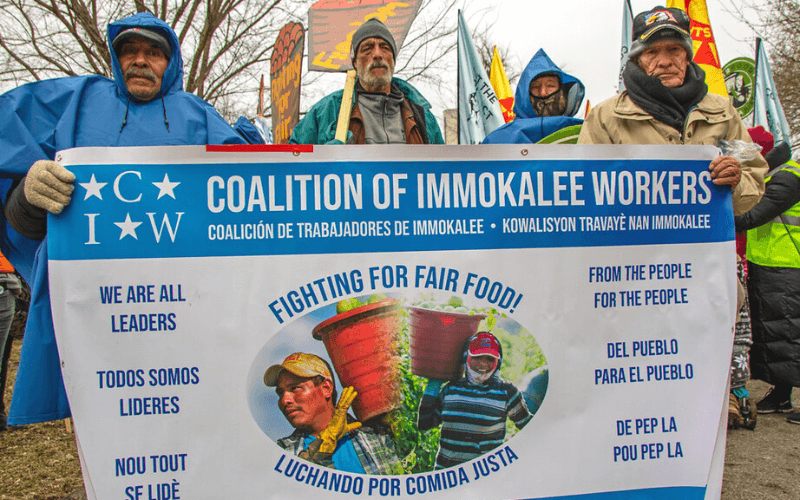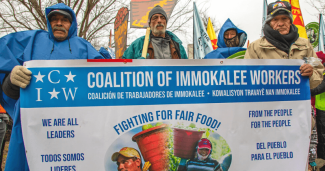Fair Food Program: Five-Day March in Florida to Build Support for Human Rights, Dignity, Worker Protections, and Fairer Wages for Farmworkers

On March 14th, farmworkers and their allies will begin a five-day Build a New World march across Florida to bring awareness to farmworker abuse and celebrate the efforts that farmworkers are taking to improve their conditions. The farmworkers behind the march, members of the Coalition of Immokalee Workers, are rejoicing in the success of the Fair Food Project, which builds partnerships between farms and retail food companies to ensure humane wages and working conditions for the people who feed our families. The remarkably successful project has brought corporations like Walmart and McDonald’s signing on to: a Fair Food premium which is paid directly to farmworkers; a code of conduct; education for workers; and other protections – and the march will encourage more retailers to join. Here, Gerardo Reyes Chávez, with the Coalition of Immokalee Workers, shared the inspiration behind the march, and more about the Fair Food Program. This interview has been edited for clarity and brevity.
The march begins on March 14th in Pahokee, Florida. Why start there?
We’re marching from Pahokee, an agricultural African-American community, because it is where one of the most recent cases of modern-day slavery took place.
It wasn’t the first case of modern-day slavery – it is just the latest. [Farmworkers] were harvesting watermelons with Los Villatoros Harvesting LLC, under Bladimir Moreno. They came contracted under the H-2A program, but they became victims of exploitation and extreme abuse. [Moreno and his team] were also committing fraud in the contracts of these workers, charging workers fees that ranged between $1000 to $2000 before they came to work in the US. They also sent fraudulent documents to the US government and they confiscated the passports of the workers with the goal of not letting them escape. They threatened workers with arrest and detention if they tried to escape.
This is not the first case of [farmworker abuse] that the Coalition has helped uncover and investigate – it’s the 13th. Modern-day slavery or forced labor continues to be a systemic problem in agriculture today. The good news is that this is not a problem without a solution. The Fair Food Program -- which is what we have built in collaboration with major buyers like Whole Foods, McDonald’s, Taco Bell, Compass Group, even Walmart, a total of 14 partnerships – has become the antidote to labor abuse. And it’s not only against modern-day slavery; it is something that is ending forced labor and sexual assault [in the fields].
And, we’re asking corporations, in this march, [particularly] Publix Supermarkets, Wendy’s, and Kroger, to join. Wendy’s is a corporation that we are boycotting right now – they need to be come part of the solution. Kroger, it was uncovered that they were one of the buyers of the watermelons harvested under those terrible conditions. So, what we’re asking them to do is to join the Fair Food Program and demand that their suppliers comply with the basic standards of human rights so that the operators of forced labor – like the one directed by Moreno and his associates – don’t have a place to operate anymore. Inside the Fair Food Program, which has been implemented in 10 states and for multiple crops, these agreements empower workers to speak up about the problems they identify, and there’s a resolution… to bring corrective action plans through the Fair Food Standards Council, which oversees compliance for both the growers and the corporations. This march is so we can expand the protections that we have crafted, to make sure that the dignity of people is not stepped on by any of the criminal groups that have been forcing workers [to labor] under brutal conditions.

Fair Food Program started out with tomatoes, but has expanded. How has it grown over time?
We’ve expanded the protections into other crops. There are flowers in Virginia, bell peppers, peaches, tuxedo corn… Any corporation that participates with us does it with the goal of working with us to implement the provisions that we created originally for the tomato fields [for other crops]. For example, Whole Foods buys and sells flowers, so…we basically adapted the Fair Food Program to be able to deal with the problems that are more prevalent in the production of tulips. It depends on the buyer, and all of them are doing their part in implementing this along with us.
What does the Fair Food Program look like for workers? What are the practical changes they experience?
Whether tomatoes or flowers or other crops, [the Fair Food Program is] adapted to guarantee the right to receive a bonus paid by the buyers, directly to workers and clearly stated on their paychecks. Any corporation that is buying from a farm, that [Fair Food Program premium] needs to be passed on through the payroll system, to make sure workers have a little more at the end of the week.
[Farmworkers are guaranteed] the right to complain without fear of retaliation. That is possible because at the top of the supply chain, all of these brands, when they buy [from farms], they do it conditioning their purchasing on the implementation of those rights. No workers can be fired for speaking up. There cannot be retaliation against the worker, if a grower wants to keep in compliance with the Fair Food Program and keep business with those corporations, and any in the future. It reinforces those protections [where farms have already implemented them] but it can also help us expand to whatever place these corporations have already been buying.
And what are the benefits for the farms, or the corporations?
It’s a blessing to any farm because it secures faithful business relationships on the basis of respecting human rights of workers. Any corporation who joins and has the need of any of the produce of any grower is going to do so on this basis.

Why are you boycotting Wendy’s in particular?
[For years, we have asked] Wendy’s to join, to use their buying power to guarantee that workers’ human rights were protected in their supply chain. Instead, they escaped their responsibility -- they began buying from Mexico -- more than 270 workers and their families migrating to Jalisco, forced to work under horrible conditions. No beds, for example, [they] have to sleep on top of pallets and cardboard. No working stove or electricity, no working bathrooms or running water. They had to cook outside with branches and cinder blocks. They were freed by the Mexican army. That’s the kind of business that Wendy’s decided to support while cutting ties and punishing their own suppliers in the US, just so they wouldn’t have to sign on to the Fair Food Program. [We are asking them to] bring business back where conditions are fair for workers under conditions of the Fair Food Program, or bring the Fair Food Program to the operations where they are currently operating. Stop giving excuses. Wherever there is food production and there are no systems in place to protect workers … we will continue to see the abuses that have always plagued the food industry.
What can consumers do?
There’s no need for suffering to be part of our food. We can eradicate it together. We need to expand these [programs] as far and wide as possible, but it depends on the consciousness of the entire nation. We are connected as human beings. The work we do to provide food for the rest of the country, sometimes, in the case of modern-day slavery, doesn’t even provide a decent meal for the workers. There’s a sacredness in the production of food that needs to be respected and the sacredness of the hands of the workers.
During the march, I ask everyone to stay informed about what we are doing. We will be posting information on our website – and also on social media. Help us amplify this message by making it a conversation at the dinner table with your family. The more we talk about this with other people, the more we’re able to connect on a human level. Try to imagine how difficult it is for people that are coming to this country under this H-2A visa, trying to give their families a better chance, to feed them in a dignified way, and encounter these conditions. We all can stop this. We have the solution in our hands. We just need more people to highlight that in their own spheres.
If you can support these efforts, we’re always in need of resources, that’s always welcome. But the most important thing is to stand with us. This [Wendy’s] boycott is happening nationwide. Bring the message of solidarity to the people of Immokalee. You are welcome to write a message that we can read in the mornings [of the march] for people to know we’re not alone. Organize your own actions in solidarity, if you’re moved to do that. It will continue until Wendy’s signs onto the Fair Food Program. For many people across the country, when we are calling upon the support of our conscious consumers and allies, we declare a national day of action – it can be a small or big protest, it can even be delivering of a letter to a manager of a local Wendy’s, that you are expecting them to do better, and the same is true of other brands.
We’re not sharing these stories to make people feel pity for us. That doesn’t change the conditions in the fields. We’re asking people not to do it out of pity, not to do it because they hear the suffering and feel that way – we don’t want that. We want them to do it out of love, for the things we have already done and provided for everybody else. We’re simply asking that we can have the same ability to provide our families with a decent meal in the way that we provide that for everybody else. We recognize our full humanity. When people hear about farmworkers, there are many stereotypes about who we are. People tend to forget our humanity and that’s something that also needs to change. We also have dreams, families, we are here to do the best we can to do our jobs -- but we’re not willing to give up our dignity at all.
That is something that we are asking people to do with us, not for us. Stand with us, and to follow our lead, because we know exactly where it hurts and we have the antidote to the problems that have long impacted [us] and taken away the dignity from those who provide food for everyone.
Learn more about the Fair Food Program: https://fairfoodprogram.org/
Read more about the march: https://ciw-online.org/
- Log in to post comments
